In This Article
- What is a postgraduate business degree?
- What is a postgraduate commerce degree?
- How are postgraduate business and commerce degrees similar?
- How are postgraduate business and commerce degrees different?
- Who should study a postgraduate business degree?
- Who should study a postgraduate commerce degree?
- MBA vs MCom: Which course should you study?
- Choose a business path that aligns with your goals

If you’re planning to build a long-term career in business by pursuing postgraduate study, choosing the right field of study is a crucial step. Postgraduate business and commerce degrees both generally offer advanced knowledge in core business principles, but which one aligns best with your goals?
In this article, we explore what postgraduate business and commerce degrees usually entail and highlight the key differences between them. If you’re contemplating whether to study a Master of Business Administration (MBA) or a Master of Commerce (MCom), we’ve included a short quiz to help you figure out which course suits you better.
What is a postgraduate business degree?
A postgraduate business degree is typically designed to deepen your knowledge and skills to advance your career in the business world. This qualification typically covers core areas like management, marketing and human resources, giving you a broad understanding of how organisations function. Based on your interests and goals, you can choose to study a general business degree, such as an MBA, that covers multiple business areas or study a specialised business course that allows you to explore a particular discipline in depth, such as entrepreneurship, project management or international business.
Besides refining your business acumen, postgraduate business courses can also help you build practical and transferable skills that are valuable across industries. Through coursework and hands-on experiences, such as case studies, real-world simulations and internships, you can learn how to think critically, solve complex problems and communicate effectively with others. These experiences can help prepare you to lead projects and teams, manage resources and make an impact in your organisation.
Below are some common types of postgraduate business degrees:
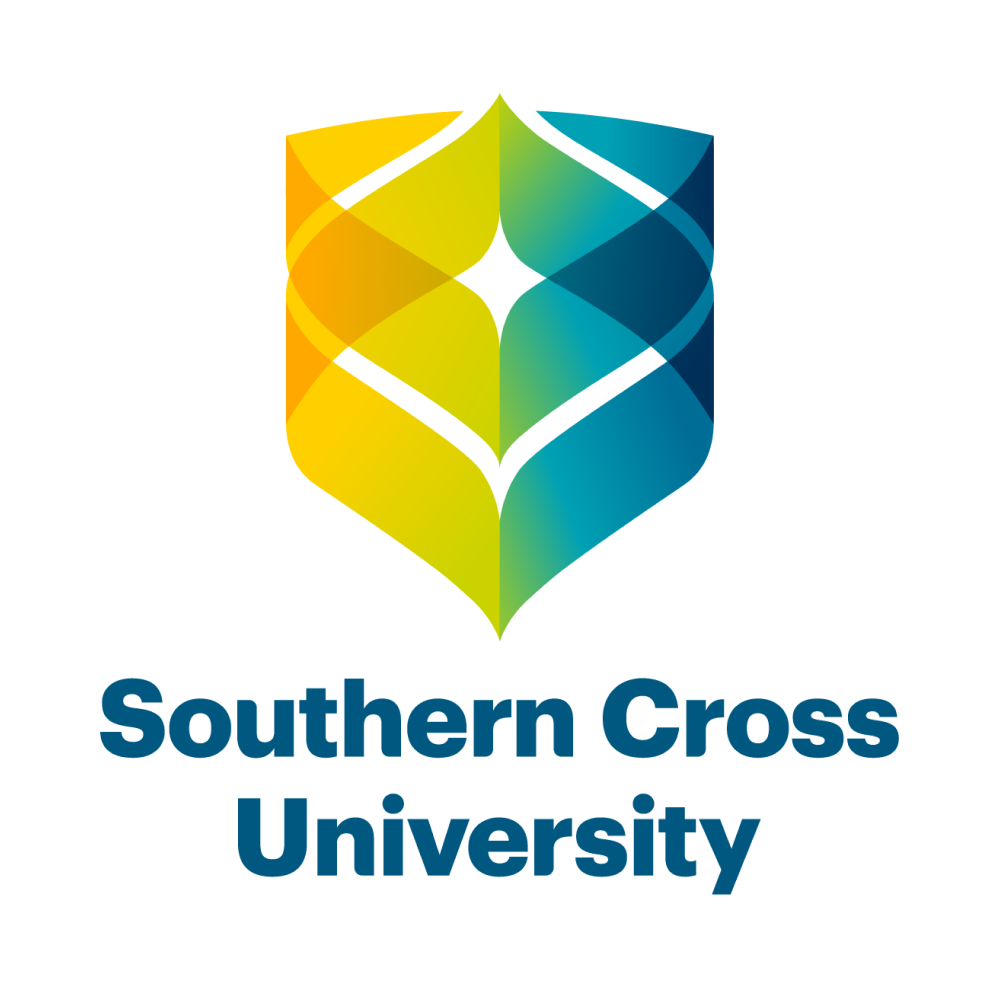

Southern Cross University aims to provide an exceptional education experience through SCU's unique learning model and innovative online platform. We’re committed to lifelong learning and providing equal access to education for everyone, regardless of background or location.
As one of the top universities in the world, at only 25 years young, we’re pioneers in online education and have been doing so since 2015. We’re a rising, dynamic university that is proud to be a game changer and educational leader. That’s the SCU Online difference and why you should study an MBA online with us.
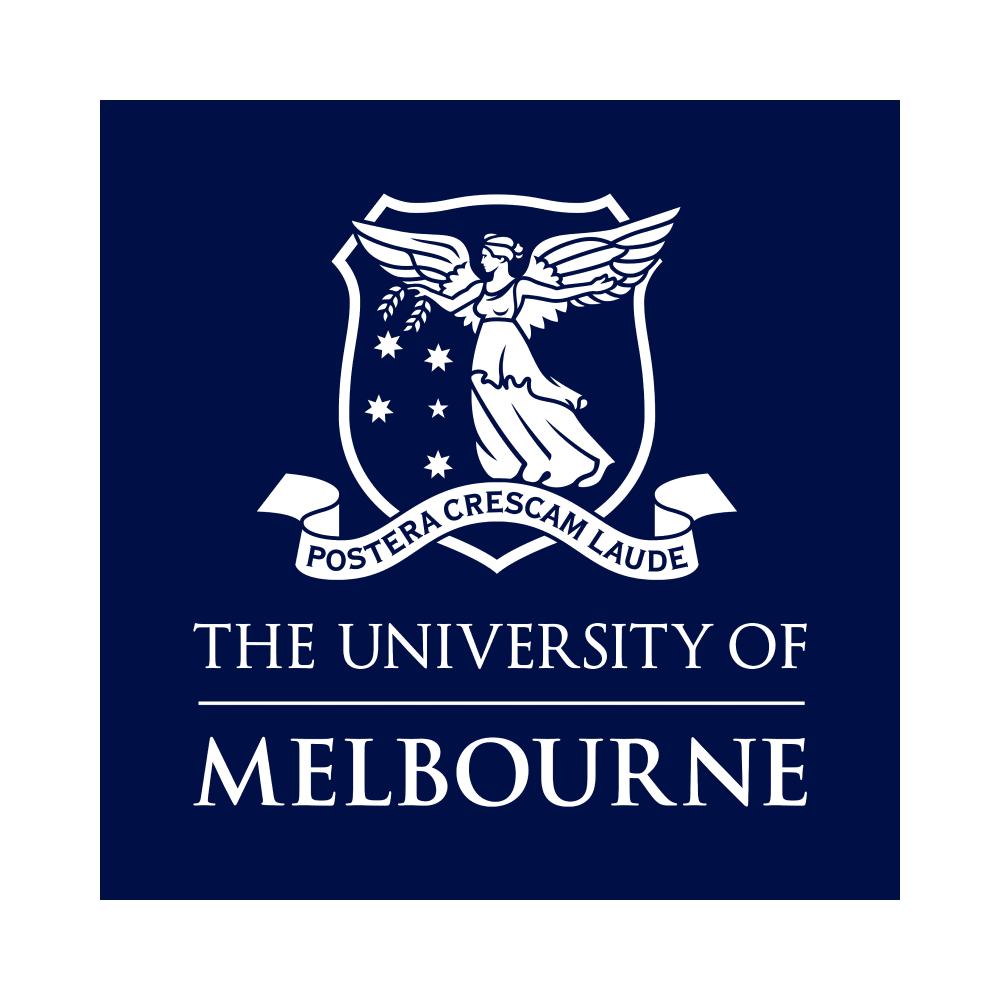

Why study business at Melbourne?
- Core business knowledge. Cover accounting, finance, decision-making and analytics to build solid foundational knowledge.
- Hone your leadership skills. Build comprehensive leadership and management knowledge, covering topics like adaptive leadership, talent management and stakeholder engagement.
- Meet today’s challenges. Learn how to navigate decision-making in a digitised world, lead sustainable organisations and manage lean resources for high performance.
Course aims
The Master of Business is designed for students to learn and apply concepts around:
- Adaptive and strategic leadership
- Talent and team management
- Influencing and engaging stakeholders for strategic outcomes
- Complex decision-making in a digitised world
- Customer service excellence and developing customer-centric cultures
- Managing sustainability for value
- Strategy at the front line
- Effective resource management: high performance and lean operations


Take your career to the next level and become a leader in marketing with QUT’s Master of Business (Marketing). Help businesses and organisations craft innovative, impactful marketing campaigns that captivate audiences, build brand awareness and drive measurable results.
Whether you're a marketing professional looking to enhance and refine your skills or you're interested in pursuing a career in the exciting and ever-evolving field of marketing, QUT's Master of Business (Marketing) can help you achieve your goals.
In this program, you will learn how to identify and capitalise on opportunities in domestic and international industries while mitigating threats.
You will also gain a comprehensive understanding of the latest concepts, strategies and techniques of customer-centric marketing. These include value-based marketing, strategic marketing planning, consumer behaviour, market segmentation and targeting and marketing mix decisions.
Real-world learning is embedded in this course and from your very first semester you will meet and be taught by award-winning academics working in industry and prominent marketing professionals who often guest lecture in our units.
In the final capstone unit, you'll take your skills to the next level with a unique opportunity to collaborate independently and in teams on real-world client projects with one of our industry partners. This immersive experience will not only advance your knowledge and research skills but also provide you with valuable workplace experience, setting you up for success in your future marketing career
What is a postgraduate commerce degree?
A postgraduate commerce degree tends to focus on the analytical side of how businesses operate and is designed to prepare professionals for advanced roles in both corporate and public sectors. This qualification usually offers a curriculum covering areas like accounting, finance, economics and business law, with opportunities to gain technical proficiency in financial reporting, accounting software and data analysis. If you’re looking to hone your expertise in a particular field, many commerce courses allow you to specialise in a discipline like finance, business analytics or supply chain management.
A postgraduate commerce degree also helps you develop vital skills like analytical thinking, problem-solving and decision-making. The practical learning experiences in this degree, which can include research projects, consultancy experiences and internships, can help you apply your technical skills in real-world settings. Whether you’re aiming for a specialist role in accounting, consulting, banking or a related sector, a commerce degree can help provide you with the business and technical capabilities to achieve your professional goals.
Discover examples of commerce degrees at postgraduate level below:
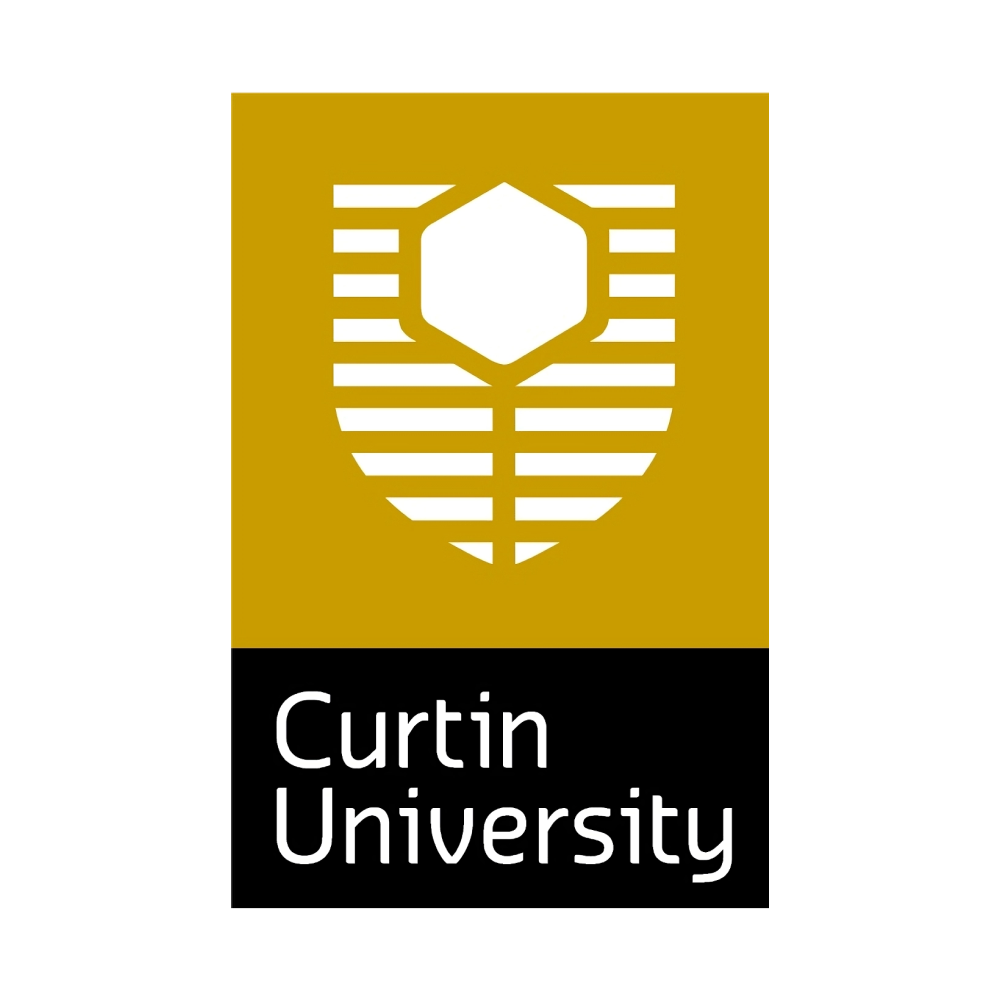

This is an ideal postgraduate degree for professionals who want to specialise or upskill in a particular area of commerce. Business professionals may also be eligible for credit for recognised learning (CRL) and their master's degree in just one year.
This course incorporates Curtin Business School's future-focused ‘GRIT’ concepts—global, responsible, innovative and technology–driven—which reflect the skills the World Economic Forum has identified as non-negotiable for the 21st century.
You will study commerce subjects that will enhance your employability – including business project management, business analytics, data visualisation and transformative technologies that impact society and its business practices. These core units will extend your knowledge in business and STEM and enable you to network with a broader range of peers.
You’ll then focus on a major of your choice from the list below, developing an advanced understanding of that area's principles and practices:
- Artificial Intelligence and Business Analytics
- Finance
- Human Resources
- International Business
- Marketing
- Supply Chain Management
- Sustainable Business Leadership.
Through practical learning experiences, you will sharpen your ability to solve complex business challenges and acquire valuable research skills that you can apply to your chosen industry.
Your studies also include several transformative experiences and capstone units:
- Corporate Sustainability Immersion: This is a work-integrated learning experience, in which you’ll participate in an industry-connected business innovation project centred on sustainable development and social impact.
- Wicked Problems: In this unit, you’ll explore multifaceted real-world challenges with global, community and individual repercussions.
- Executive Education: Choose five one-day masterclasses (or equivalent) focused on training in leadership, strategy, innovation, negotiation, communication, or digital transformation.
- Capstone Experience: This unit may comprise an internship, consultancy experience, research project or international study tour. In addition to growing your business acumen and skill sets, capstone experiences help you develop particular industry knowledge and networks.
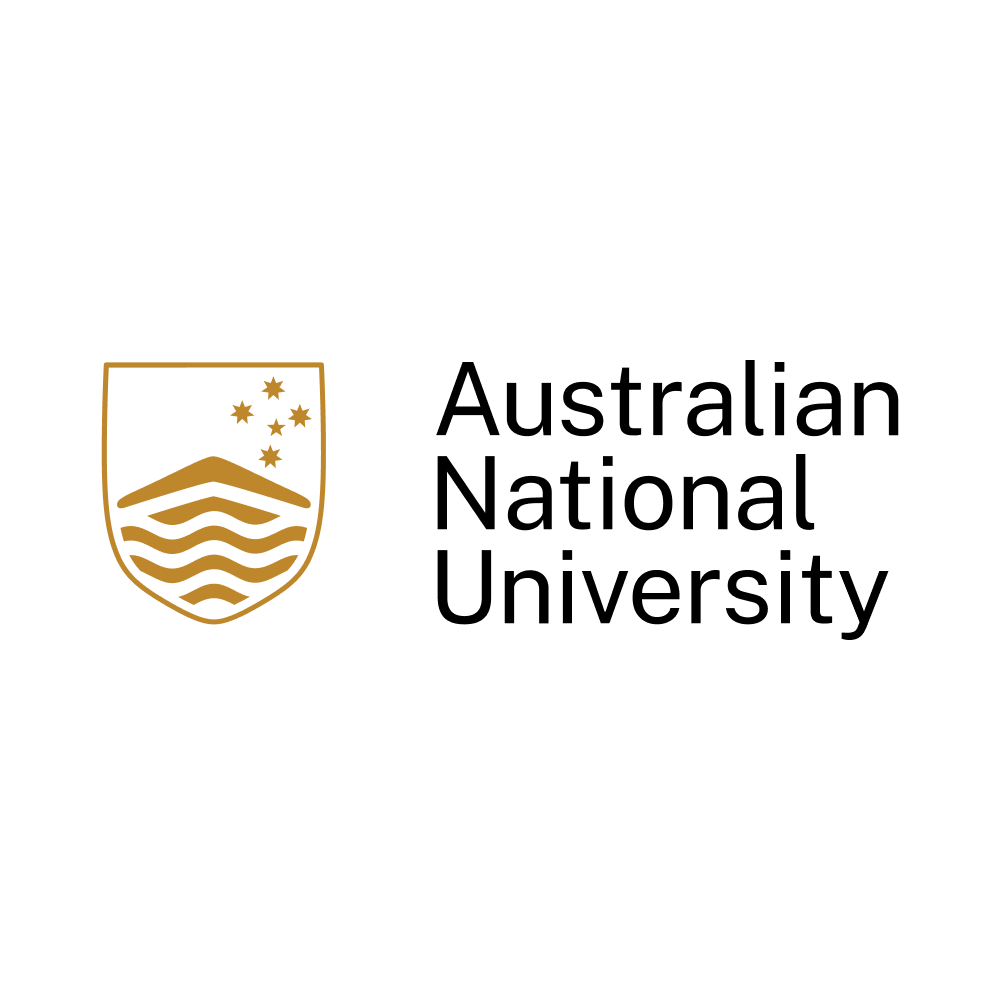

The program is taught by research-active academic staff. Students are exposed to professional and scholarly academic research in accounting, enhancing their academic competence. Students will also acquire research skills in accounting and demonstrate the ability to undertake independent research.


Designed in consultation with industry, the Master of Commerce Extension (MCom (Ext)) prepares you with a depth of knowledge, a breadth of experience and the hands-on experience needed to succeed across diverse careers in business.
With 14 specialisations to choose from, the MCom (Ext) allows you to study one or two areas of business. You’ll then broaden your knowledge through electives that prepare you for future careers, such as analytics or fintech.
How are postgraduate business and commerce degrees similar?
Postgraduate business and commerce degrees share several common features, especially in the way they equip students with in-depth knowledge crucial for building a career in the corporate world. Both degrees can help prepare graduates for a wide range of advanced positions across business sectors, including areas like financial services, consulting and logistics. These degrees usually offer units that cover key business disciplines like finance, management and marketing. Many programs also offer specialisations or elective options to allow you to focus on specific areas of interest.
Besides business knowledge and technical expertise, both degrees can help students build essential soft skills through coursework and experiential learning. By developing competencies in communication, collaboration and critical thinking, which are highly valuable in the workplace, students can be well-equipped to thrive in various professional environments throughout their careers.
How are postgraduate business and commerce degrees different?
A postgraduate business degree tends to offer a broader focus on general management, while a postgraduate commerce degree is typically more analytical and technical. Although they share some similarities, they often differ in their curriculum structure, entry requirements, tuition costs, potential career pathways as well as global opportunities and demand. To delve into these differences, explore how an MBA compares with an MCom below:
Core units and electives
The core units of an MBA typically cover cross-functional areas of business, designed to help you become a well-rounded business leader who understands how various departments collaborate to achieve organisational success. For example, some of the core units of the University of New South Wales (UNSW)’s AGSM Master of Business Administration include Foundations of Responsible Management, Accounting and Financial Management, Strategy and Marketing Management. In contrast, an MCom’s core units usually emphasise building your technical proficiency. UNSW’s Master of Commerce, for instance, requires you to complete a data analysis core unit in either Data Literacy for Business or Data Visualisation and Communication.


The AGSM Master of Business Administration (MBA) is a full-time, accelerated degree designed to prepare students for senior leadership roles across the private, public and not-for-profit sectors. Expand your skill set for the future through active learning experiences while unlocking the practical tools you’ll need to thrive in your professional endeavours.
Gain insights from renowned academics and industry leaders in the corporate, government, and not-for-profit sectors. Through their teachings of contemporary foundational and elective courses, your studies will focus on strategy, finance and marketing, innovation, entrepreneurship, digital transformation, technology and social impact.


Designed in consultation with industry, this world-class business degree prepares you with the experience and knowledge you need to succeed in the career you want. This degree is career-focused from day one. Whatever you specialise in, you’ll connect with industry, learn with real-world tools and technology, and have access to work experience, career development and mentoring opportunities.
Elective units offered in MBAs are often geared towards enhancing your leadership and strategic thinking skills in diverse business functions. Taking these units can help you gain transferable skills applicable across various sectors. Below are some elective units you can choose to take when you’re studying the University of Sydney’s Master of Business Administration:
- Business Negotiations and Decision Making
- Leading Project Management
- Operations Management
- The Physiology of Leadership
- Influencing Skills for Stakeholder Engagement


The Master of Business Administration is a postgraduate coursework degree that will develop your leadership, communication and critical thinking skills and prepare you for applying these skills in the complex global business environment. You will complete core and elective units and a design-led strategy capstone unit.
The part-time degree is purpose-built to unlock your personal and professional ambitions and refine your leadership skills. Delivered on the CBD campus, this flexible course can be completed in two to three years of part-time study.
MCom electives are often more technical and aligned with specific areas of expertise. They allow you to hone your knowledge within your field of interest or explore complementary areas to broaden your capabilities. Here are a few examples of electives offered in the University of Sydney’s Master of Commerce:
- Financial Reporting and Analysis
- International Accounting
- Communication in Economics
- Cybersecurity and Risk Management
- Managing Supply Chain Disruption


The Master of Commerce is a postgraduate coursework degree that will give you a thorough understanding of commerce for use in various fields to assist you to pursue a career in business. It is designed for students with prior business or management qualifications seeking to build on their existing expertise.
Specialisations
While some MBA and MCom courses may share some overlapping specialisations, such as accounting, finance and marketing, their focus and learning outcomes may differ. MBA specialisations tend to focus on boosting leadership and management expertise within a specific domain. For example, UNSW’s online AGSM Master of Business Administration (General) offers specialisations like Social Impact, Sustainable and Inclusive Business, Change and Technology, which lean towards developing visionary leaders who can drive transformation across sectors.
MCom specialisations, on the other hand, are usually designed to develop technical expertise in a particular discipline. At UNSW, the Master of Commerce program offers specialisations in a variety of areas like Business Analytics, Digital Transformation, Financial Technology and Marketing Analytics. These specialisations can help equip you with a strong grasp of data-driven decision-making, emerging technologies and the tools needed to tackle complex business challenges within your chosen field.


This Master of Business Administration (MBA) course is designed for professionals seeking an array of intellectual tools and frameworks to manage business and lead people, particularly where aspects of management intersect with changes in business and society.
The MBAX (General) is designed to help working professionals and aspiring leaders take the next step in their leadership careers. It offers the flexibility to study electives across a range of topics to develop a wide scope of expertise.
The program comprises core subjects and electives, all guided by industry professionals, giving you the flexibility to tailor your studies to your interests. You'll have the option to learn in various formats, choosing from online and face-to-face learning – or a combination of both.
Admission requirements
MBAs and MComs often accept applicants with bachelor’s qualifications from any background. However, some MCom courses may require an undergraduate degree in a relevant field. For instance, Monash University’s two-year Master of Business Administration (Digital) program accepts applicants with any Australian bachelor’s degree or equivalent. Meanwhile, the university’s Master of Commerce course requires you to have an Australian bachelor's degree, or equivalent, in a relevant discipline, such as accounting, banking and finance, economics, management or marketing.


The Master of Business Administration (Digital) provides the knowledge and skills you need now, as well as the strategies and methods you need to stay informed, relevant, and current as an uncertain future unfolds. In this degree, you will be equipped to:
- Lead the adoption of new technologies and perspectives across business operations.
- Make innovative and informed strategic choices in light of changes in business's economic, political, and environmental context.
- Maintain currency with ongoing changes in business practice for the balance of your career.
The course comprises 12 units: Six Operational Knowledge units covering contemporary practice across the primary functions of any organisation; three Organisational Skills units including Strategic Management, Leadership, and Innovation; and three Professional Skills units including methods for Currency and Lifelong Learning, Career Advancement, and Professional Community Development.
You can begin your Master of Business Administration (Digital) within weeks of making your application. Online delivery lets you fit study around your busy work and family commitments. With flexible delivery, you can set your pace to meet changing circumstances.
As a Master of Business Administration (Digital) graduate, you’ll have the knowledge and skills necessary to advance your career and take your place as a strategic manager and leader no matter what comes next.


The Master of Commerce is offered as part of an Integrated PhD program at Monash Business School – meaning it’s a compulsory pathway towards a PhD. This first step is designed to equip you with the skills to participate in deeper, best-practice research, while also expanding on what you’ve already learned in your commercial studies and career so far.
Devise and deliver an independent research project in your chosen specialisation alongside an industry-leading supervisor, who will help guide you through the project.
The Master of Commerce is the compulsory doctoral pathway for the banking and finance specialisation and a preferred doctoral pathway for accounting, econometrics, business statistics, economics, health economics, management and marketing specialisations.
Most students who complete the Master of Commerce go on to join the forward-thinking, impact-shaping post-doctoral community. Equipped with the expertise needed to deliver research and results at this level, you’ll be set to make your mark responding to some of the most pressing economic, environmental, social and commercial challenges impacting our world today.
Academic performance is another area where these programs’ entry requirements may differ. An MCom program may require you to have a higher weighted average mark (WAM) than an MBA, as it’s typically more theory-intensive. At Monash University, the MBA course requires a minimum WAM of 60 per cent, while the institution’s Master of Commerce sets the bar higher at 70 per cent. This demonstrates the need for a stronger academic track record to show you’re well-prepared for the MCom’s more technical curriculum.
Professional experience may also be a distinction in these two programs’ entry requirements. MBA programs typically target mid-career professionals and often require several years of relevant work experience. The Master of Business Administration (Intensive) at the University of Western Australia (UWA), for example, requires at least three years of professional experience in a relevant occupation. UWA’s Master of Commerce program, in contrast, requires at least two years of professional experience.


In this accelerated program, UWA's cohort-based MBA offers an accelerated course of study that will enhance your career prospects anywhere in the world. The strong leadership focus is tailor-made for the next generation of leaders and influencers.
The MBA Intensive has one annual intake of 30-35 students, with evening and weekend classes commencing in January each year. You can choose to complete the program in 12 to 18 months, depending upon your own work and personal circumstances. Use the university's Summer and Winter School teaching sessions to accelerate your MBA studies and fast-track your career. Entry is competitive, which ensures you’ll be working alongside the best.
The MBA Intensive has eight core units and four option units. Regardless of the study mode you select, you will complete the majority of your units with the other MBA Intensive students in your cohort, which is a strength of cohort-based MBA programs around the world. For your option units, you will have the opportunity to expand your business network further by studying alongside students in the MBA Flexible program.
The MBA Intensive has the following unique features:
- A year-long Authentic Leadership Program developed by a world-class UWA Leadership School.
- One-on-one mentoring from a senior industry executive.
- Extensive career services support: coaching and workshops via MBA Career Services and industry professionals.
- Strategic Analysis and Consulting Project, working on a real project for one of the university's partner organisations (previously including Woodside, BHP, Rio Tinto and Reconciliation WA).
- Dedicated masterclasses with senior executives and senior managers from top ASX companies and government departments.
- Direct contact with members of the Business School Board.


The Master of Commerce is ideal for recent graduates seeking to develop further expertise to pursue careers in business.
It is suited both to graduates with a non-business degree seeking a postgraduate qualification in business and to business graduates wanting to add new areas of specialisation to their skill set. You’ll complete core units in ethics, economics, financial accounting, global business, management, and marketing.
The flexible course structure gives you the choice of combining two specialisations, completing more extensive study in one specialisation, or combining one specialisation with an array of electives from across the other specialisations. Career opportunities are vast and depend on your choice of specialisation. The flexible structure enables you to design the course to suit your career interests.
Some MCom programs don’t require any professional experience, making them an accessible pathway for recent graduates or early-career professionals. The Master of Commerce at the University of Queensland (UQ) only requires a bachelor's degree in any discipline or a Graduate Certificate in Commerce from UQ. If you’re looking to study the Master of Business Administration at UQ, you’ll need four years of full-time, relevant work experience, highlighting its priority on leadership development for experienced professionals.


The Master of Commerce has been designed to equip you with the know-how to move into senior management or financial roles with a highly regarded formal qualification.
You’ll learn in a contemporary learning environment and gain practical experience by accessing the state-of-the-art Bloomberg Trading Room and by participating in the Student Managed Investment Fund project. You'll also be encouraged to consider ethical behaviour in commerce and corporate social responsibility.


The Master of Business Administration (MBA) is designed to give you a comprehensive understanding of multiple business functions and help you increase your confidence to make complex business decisions. You'll learn with an experienced cohort who will enrich your studies and connect you with ongoing career opportunities.
Design your own customised program to gain maximum value. Align your learning experience with your interests and career goals, pursue a research project or even explore topics outside the MBA.
You can incorporate your own workplace projects into your studies for applied learning opportunities, work with industry clients on solutions to real challenges, or explore your entrepreneurial projects.
Cost
MCom programs are generally less expensive than MBA courses, largely due to differences in program structure and learning experiences. MBAs often include extensive resources like case studies, study tours, industry guest lectures and other learning experiences that incur higher costs. MCom courses usually focus more on theoretical knowledge and research, with fewer experiential components.
To provide a clearer picture, here are some indicative annual fees for 2026 from Australian universities that offer both MBA and MCom programs:
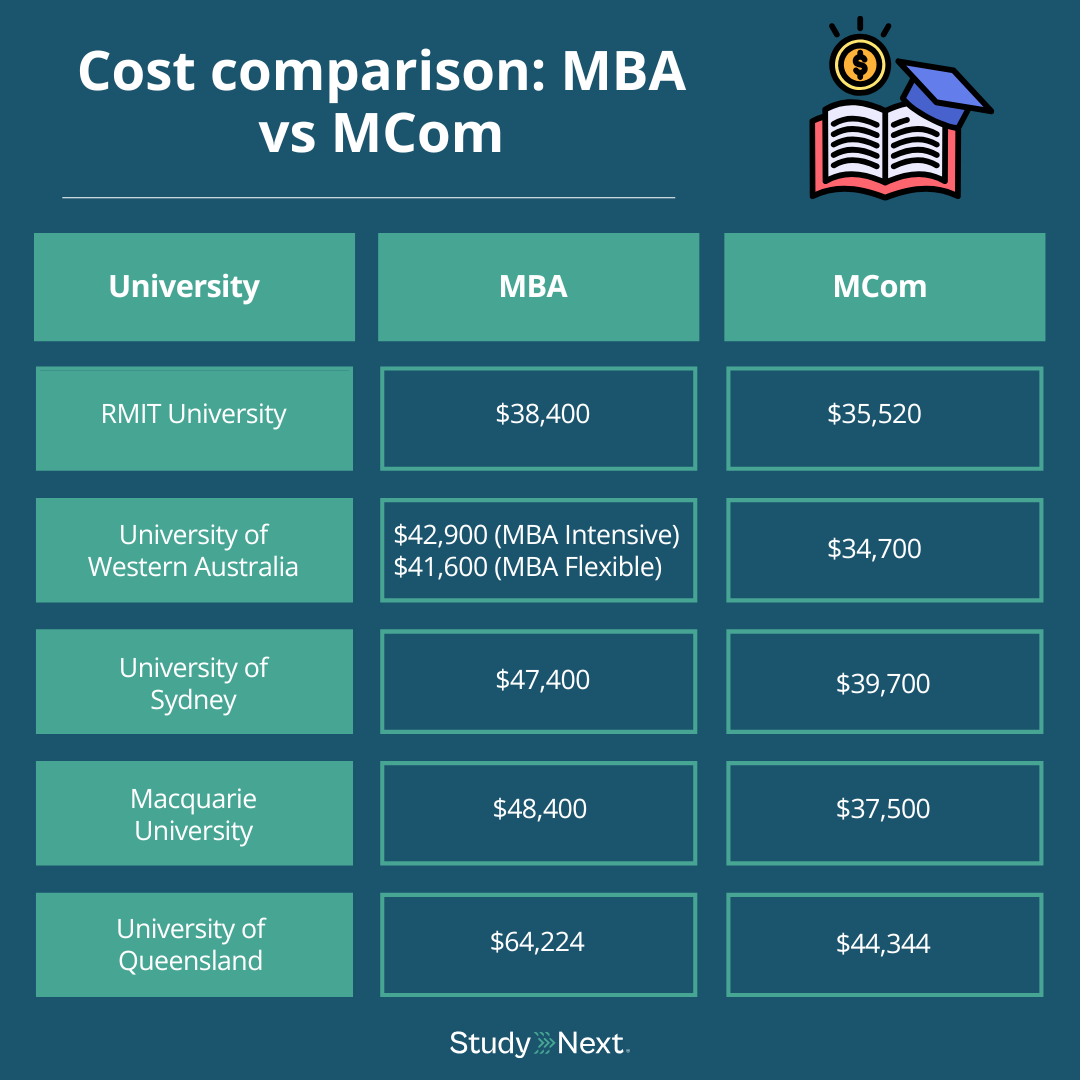
Global exposure
While both MBAs and MComs offer practical opportunities where you can gain hands-on experience and network with industry professionals, MBA programs are more likely to integrate international exposure as part of their curriculum. These programs are designed to equip future and emerging business leaders with an understanding of global market dynamics, international business strategy and cross-cultural management.
For example, Macquarie University’s Master of Business Administration offers the International Study Tour elective. This unit aims to hone your knowledge and understanding of the global business environment and how businesses operate in foreign markets through first-hand observation in a foreign country. Similarly, UQ’s MBA program offers optional short-term exchanges with prestigious partner institutions like Harvard Business School in the United States, providing you with the opportunity to expand your global network.


With the Master of Business Administration, you can become a manager. Designed to challenge and transform, the MBA admits you into a diverse and highly experienced cohort that's industry-focused. Taught by handpicked academics and experts who bring innovative knowledge and research to the classroom, the degree ensures you build robust connections with industry – and see an impact on your own work. Your leadership skills and personal development will skyrocket with many opportunities to support your growth, including psychometric testing and one-on-one coaching. Additionally, the degree presents an outstanding opportunity to build on the knowledge you may have gained in a graduate diploma, certificate, or microcredential.
The MBA is primarily delivered at our City Campus. However, some units are offered at our Wallumattagal Campus in Macquarie Park or online. To complete the degree, you may need to attend classes at both campuses and/or online.
Potential career outcomes
Earning an MBA or MCom can equip you with a versatile skill set that can open doors to a wide range of career opportunities across government agencies, corporate enterprises and not-for-profits. These programs are often designed to build knowledge and capabilities that allow you to navigate different industries and adapt to diverse professional environments.
MBA programs are generally tailored for mid-career professionals aiming to move into leadership roles or start their own business. Typical career paths include:
- Chief executive officer
- Chief operating officer
- Operations manager
- Business development manager
- Entrepreneur
If you graduate with an MCom degree, you can explore specialised roles that require technical expertise and analytical skills. These roles span both public and private sectors and may include:
- Business analyst
- Financial analyst
- Accountant
- Market analyst
- Economist
It’s important to note that your postgraduate degree doesn’t lock you into a specific career path. While MBAs often lead to strategic or leadership roles and MComs to more technical or specialist positions, your career ultimately depends on your interests, skills and experience. For example, you may land a business analyst role with an MBA or work towards becoming an operations manager with an MCom degree.
Global demand
An MBA generally has a higher and more versatile demand in the global job market due to its focus on broad managerial capabilities across diverse industries. According to the 2025 Corporate Recruiters Survey by the Graduate Management Admission Council, 90 per cent of global employers plan to hire MBA graduates in 2025, with one-third intending to increase their MBA recruitment compared to the previous year.
This trend also extends to specialised fields like finance and accounting, where about a quarter of employers in these sectors are planning to expand their MBA hiring. This suggests that a specialised degree like an MCom may not always be a prerequisite to enter these fields. An MBA may offer a flexible pathway for you to move across roles and industries.
Who should study a postgraduate business degree?
Studying business at postgraduate level may be a good fit for individuals who want to enhance their understanding of how organisations function and thrive. If you’re interested in how companies grow, navigate evolving market conditions and align teams to achieve common goals, a postgraduate business qualification can offer you advanced insight into these areas.
You may also want to study business if you value versatility and want to gain a broad skill set across core business areas like finance, marketing and strategy. If you have aspirations to lead, a postgraduate business degree often focuses on people management, strategic decision-making and practical problem-solving. Whether you’re looking to be your own boss and start a business or take charge of corporate projects, studying business may help equip you with the tools to support your professional ambitions.
Who should study a postgraduate commerce degree?
If you enjoy working with numbers and tackling business challenges through analysis and logic, studying a postgraduate commerce course may be ideal for you. This field may also suit you well if you’re looking to develop skills in more technical areas in business like finance, accounting and economics. Depending on the area you’re specialising in when you study commerce, you may explore how to interpret financial information, delve into legal frameworks governing business operations and understand how economic factors can shape business decisions.
Commerce may also be an appealing choice if you prefer working behind the scenes rather than leading strategic ventures from the front. Specialist roles, such as financial analyst, accountant and data analyst, are essential to helping companies optimise efficiency and make informed business decisions. A postgraduate commerce degree may offer you the skills and knowledge needed to grow your career in roles that demand strong technical and analytical proficiency within the business landscape.
MBA vs MCom: Which course should you study?
If you’re considering whether you should pursue an MBA and an MCom to advance your qualifications, the right choice often depends on your career aspirations, interests and personal strengths. A good starting point is to reflect on what drives you professionally and where you see yourself in the future. After you’ve identified your long-term goals, you can explore courses offered by leading Australian universities to see which programs align with what you’re looking for. You can also look into the courses’ potential career outcomes to determine if you can picture yourself thriving in those roles.
If you need a hand figuring out which field aligns better with you, take our short quiz below.
Quiz: Should you study an MBA or an MCom?
1. What kind of units appeal to you in a course?
A) I prefer units that emphasise leadership and strategic thinking as well as cover diverse business areas, such as entrepreneurship, operations and marketing
B) I prefer units that focus on specialised knowledge and technical skills, including accounting, data analytics and economics
2. What type of learning environment would you prefer?
A) It needs to be interactive and include hands-on experiences like case studies and consulting projects
B) I want to study in a structured setting with lectures and theoretical coursework
3. Is networking and leadership development important to you?
A) Yes, I want to build a strong professional network and grow as a leader
B) Somewhat, but I’m more focused on refining my technical skills
4: What type of challenges do you enjoy solving at work?
A) I enjoy tackling high-impact challenges like developing strategies to boost profitability or leading business expansion projects
B) I prefer solving analytical problems like forecasting financial trends or identifying operational risks using data
5. What’s your ideal career path?
A) I’m interested in pursuing a career as a business leader, executive or entrepreneur
B) I would like to work in a specialist role in a field like accounting, finance or analytics
6. What motivates you the most in your career?
A) I want to manage teams and drive long-term business impact
B) I want to leverage my technical expertise to solve complex problems and deliver results
Results
Mostly A’s: You may want to consider studying an MBA. During your studies, you’ll likely be able to strengthen your business acumen and develop leadership capabilities. You may also gain valuable industry perspectives and build connections that could support your professional growth. This qualification can help prepare you for a leadership role where you can inspire teams and make high-impact business decisions.
Mostly B’s: An MCom could be a better choice if your priority is developing deep technical expertise in a specific discipline. If you enjoy working with data and analytical frameworks to address and solve issues, an MCom can offer you the theoretical and practical learning experience you need. The knowledge and experiences you gain through an MCom course can help boost your career prospects in specialised and technical business roles.
Choose a business path that aligns with your goals
Obtaining a postgraduate business or commerce degree can help support your career advancement in the business field. However, understanding the differences between the two allows you to choose the field that better aligns with your long-term professional goals.
If you’re considering postgraduate study, take time to compare courses in each discipline to make an informed decision for your next career move. Discover a diverse range of reputable postgraduate commerce and business courses available in Australia today.























